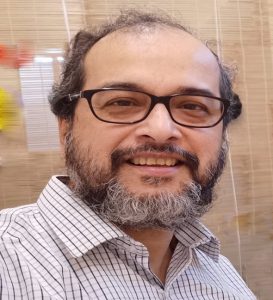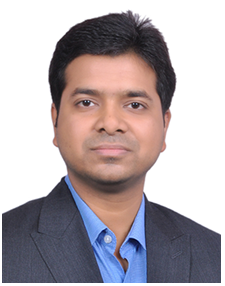The Abdul Kalam Technology Innovation National Fellowship awarded by the Science and Engineering Research Board (SERB) recognises translational research by Indian nationals to achieve excellence in engineering, innovation and technology development.
 Dibakar Sen, Professor at the Centre for Product Design and Manufacturing (CPDM), has received the fellowship for his work on the development of a smart prosthetic arm. Designing a biofidelic prosthetic arm is inherently complex as the natural arm has over 20 degrees of freedom for performing dextrous tasks. The mechanical complexity arises from the need to grasp objects of varied size, shape, and weights; the complexity of control arises from the need to use multiple motors and provide intuitive user interfaces for driving the motors. As the level of amputation increases, the number of motors necessary in the prosthesis increases, but the muscles from which the control signals can be obtained decreases. Consequently, most available prostheses have limited capability, require extensive pre-usage training and cause in-usage fatigue. This eventually leads to a high rejection rate for even advanced prostheses. There is a need to significantly improve the user interaction by minimising their active involvement in the control of individual motors. The aim of this work is to develop a system to support autonomous orientation of the wrist of a trans-radial prosthetic arm, in the first stage. Subsequently, attempts will be made for autonomous movement of the elbow joint of a transhumeral prosthesis for common tasks.
Dibakar Sen, Professor at the Centre for Product Design and Manufacturing (CPDM), has received the fellowship for his work on the development of a smart prosthetic arm. Designing a biofidelic prosthetic arm is inherently complex as the natural arm has over 20 degrees of freedom for performing dextrous tasks. The mechanical complexity arises from the need to grasp objects of varied size, shape, and weights; the complexity of control arises from the need to use multiple motors and provide intuitive user interfaces for driving the motors. As the level of amputation increases, the number of motors necessary in the prosthesis increases, but the muscles from which the control signals can be obtained decreases. Consequently, most available prostheses have limited capability, require extensive pre-usage training and cause in-usage fatigue. This eventually leads to a high rejection rate for even advanced prostheses. There is a need to significantly improve the user interaction by minimising their active involvement in the control of individual motors. The aim of this work is to develop a system to support autonomous orientation of the wrist of a trans-radial prosthetic arm, in the first stage. Subsequently, attempts will be made for autonomous movement of the elbow joint of a transhumeral prosthesis for common tasks.
 Pramod Kumar, Associate Professor in the Department of Mechanical Engineering, received the fellowship for contributions to the field of supercritical carbon dioxide (sCO2) Brayton power and refrigeration technology, heat transfer, and thermal system design. His research on sCO2 power and refrigeration addresses fundamental scientific principles and technical challenges leading to realisation of the technology in India. Currently, his group is developing a deployable prototype of a kilowatt-scale sCO2 power block for pilot scale demonstration. Kumar’s group has a strong collaboration with leading industries such as Danfoss, Triveni Turbines, TDPS, BHEL, Eagle Burgmann, ANSYS, TCE and academic institutions, both in India and abroad. MoUs have been signed with NTNU, Norway, IIT M, IIT KGP and University of Stuttgart, Germany to help commercialise both refrigeration and carbon dioxide based technologies. These technologies fit the national mission of “Make in India” and have the potential to be completely indigenised.
Pramod Kumar, Associate Professor in the Department of Mechanical Engineering, received the fellowship for contributions to the field of supercritical carbon dioxide (sCO2) Brayton power and refrigeration technology, heat transfer, and thermal system design. His research on sCO2 power and refrigeration addresses fundamental scientific principles and technical challenges leading to realisation of the technology in India. Currently, his group is developing a deployable prototype of a kilowatt-scale sCO2 power block for pilot scale demonstration. Kumar’s group has a strong collaboration with leading industries such as Danfoss, Triveni Turbines, TDPS, BHEL, Eagle Burgmann, ANSYS, TCE and academic institutions, both in India and abroad. MoUs have been signed with NTNU, Norway, IIT M, IIT KGP and University of Stuttgart, Germany to help commercialise both refrigeration and carbon dioxide based technologies. These technologies fit the national mission of “Make in India” and have the potential to be completely indigenised.
 Mayank Shrivastava, Associate Professor in the Department of Electronic Systems Engineering, received the fellowship for his “outstanding contributions in the field of Micro/Nanoelectronics, Semiconductor Physics as well as contributions in the growth of the engineering profession in the country.” Prof Shrivastava broadly works on applications of emerging materials like Gallium Nitride (GaN), atomically thin two-dimensional materials like Graphene and TMDCs, in electronic and electro-optic devices working closer to its fundamental limits (like the ability to handle extreme powers, ability to work at THz like ultra-high frequencies, or ability to compute information in unconventional ways). Currently, his group is developing few-atom thick neuromorphic circuits (ICs), GaN-based ultra-high-power devices with high reliability, and devices/circuits for operation at THz frequencies. Prof Shrivastava is also one of the co-founders of a GaN manufacturing startup named AGNIT Semiconductors Pvt. Ltd. Prof Shrivastava’s work has resulted in over 150 peer-reviewed publications and 50 patents. Most of these patents are either licensed by semiconductor companies or are in use in their products.
Mayank Shrivastava, Associate Professor in the Department of Electronic Systems Engineering, received the fellowship for his “outstanding contributions in the field of Micro/Nanoelectronics, Semiconductor Physics as well as contributions in the growth of the engineering profession in the country.” Prof Shrivastava broadly works on applications of emerging materials like Gallium Nitride (GaN), atomically thin two-dimensional materials like Graphene and TMDCs, in electronic and electro-optic devices working closer to its fundamental limits (like the ability to handle extreme powers, ability to work at THz like ultra-high frequencies, or ability to compute information in unconventional ways). Currently, his group is developing few-atom thick neuromorphic circuits (ICs), GaN-based ultra-high-power devices with high reliability, and devices/circuits for operation at THz frequencies. Prof Shrivastava is also one of the co-founders of a GaN manufacturing startup named AGNIT Semiconductors Pvt. Ltd. Prof Shrivastava’s work has resulted in over 150 peer-reviewed publications and 50 patents. Most of these patents are either licensed by semiconductor companies or are in use in their products.


 Dibakar Sen, Professor at the Centre for Product Design and Manufacturing (CPDM), has received the fellowship for his work on the development of a smart prosthetic arm. Designing a biofidelic prosthetic arm is inherently complex as the natural arm has over 20 degrees of freedom for performing dextrous tasks. The mechanical complexity arises from the need to grasp objects of varied size, shape, and weights; the complexity of control arises from the need to use multiple motors and provide intuitive user interfaces for driving the motors. As the level of amputation increases, the number of motors necessary in the prosthesis increases, but the muscles from which the control signals can be obtained decreases. Consequently, most available prostheses have limited capability, require extensive pre-usage training and cause in-usage fatigue. This eventually leads to a high rejection rate for even advanced prostheses. There is a need to significantly improve the user interaction by minimising their active involvement in the control of individual motors. The aim of this work is to develop a system to support autonomous orientation of the wrist of a trans-radial prosthetic arm, in the first stage. Subsequently, attempts will be made for autonomous movement of the elbow joint of a transhumeral prosthesis for common tasks.
Dibakar Sen, Professor at the Centre for Product Design and Manufacturing (CPDM), has received the fellowship for his work on the development of a smart prosthetic arm. Designing a biofidelic prosthetic arm is inherently complex as the natural arm has over 20 degrees of freedom for performing dextrous tasks. The mechanical complexity arises from the need to grasp objects of varied size, shape, and weights; the complexity of control arises from the need to use multiple motors and provide intuitive user interfaces for driving the motors. As the level of amputation increases, the number of motors necessary in the prosthesis increases, but the muscles from which the control signals can be obtained decreases. Consequently, most available prostheses have limited capability, require extensive pre-usage training and cause in-usage fatigue. This eventually leads to a high rejection rate for even advanced prostheses. There is a need to significantly improve the user interaction by minimising their active involvement in the control of individual motors. The aim of this work is to develop a system to support autonomous orientation of the wrist of a trans-radial prosthetic arm, in the first stage. Subsequently, attempts will be made for autonomous movement of the elbow joint of a transhumeral prosthesis for common tasks. Pramod Kumar, Associate Professor in the Department of Mechanical Engineering, received the fellowship for contributions to the field of supercritical carbon dioxide (sCO2) Brayton power and refrigeration technology, heat transfer, and thermal system design. His research on sCO2 power and refrigeration addresses fundamental scientific principles and technical challenges leading to realisation of the technology in India. Currently, his group is developing a deployable prototype of a kilowatt-scale sCO2 power block for pilot scale demonstration. Kumar’s group has a strong collaboration with leading industries such as Danfoss, Triveni Turbines, TDPS, BHEL, Eagle Burgmann, ANSYS, TCE and academic institutions, both in India and abroad. MoUs have been signed with NTNU, Norway, IIT M, IIT KGP and University of Stuttgart, Germany to help commercialise both refrigeration and carbon dioxide based technologies. These technologies fit the national mission of “Make in India” and have the potential to be completely indigenised.
Pramod Kumar, Associate Professor in the Department of Mechanical Engineering, received the fellowship for contributions to the field of supercritical carbon dioxide (sCO2) Brayton power and refrigeration technology, heat transfer, and thermal system design. His research on sCO2 power and refrigeration addresses fundamental scientific principles and technical challenges leading to realisation of the technology in India. Currently, his group is developing a deployable prototype of a kilowatt-scale sCO2 power block for pilot scale demonstration. Kumar’s group has a strong collaboration with leading industries such as Danfoss, Triveni Turbines, TDPS, BHEL, Eagle Burgmann, ANSYS, TCE and academic institutions, both in India and abroad. MoUs have been signed with NTNU, Norway, IIT M, IIT KGP and University of Stuttgart, Germany to help commercialise both refrigeration and carbon dioxide based technologies. These technologies fit the national mission of “Make in India” and have the potential to be completely indigenised. Mayank Shrivastava, Associate Professor in the Department of Electronic Systems Engineering, received the fellowship for his “outstanding contributions in the field of Micro/Nanoelectronics, Semiconductor Physics as well as contributions in the growth of the engineering profession in the country.” Prof Shrivastava broadly works on applications of emerging materials like Gallium Nitride (GaN), atomically thin two-dimensional materials like Graphene and TMDCs, in electronic and electro-optic devices working closer to its fundamental limits (like the ability to handle extreme powers, ability to work at THz like ultra-high frequencies, or ability to compute information in unconventional ways). Currently, his group is developing few-atom thick neuromorphic circuits (ICs), GaN-based ultra-high-power devices with high reliability, and devices/circuits for operation at THz frequencies. Prof Shrivastava is also one of the co-founders of a GaN manufacturing startup named AGNIT Semiconductors Pvt. Ltd. Prof Shrivastava’s work has resulted in over 150 peer-reviewed publications and 50 patents. Most of these patents are either licensed by semiconductor companies or are in use in their products.
Mayank Shrivastava, Associate Professor in the Department of Electronic Systems Engineering, received the fellowship for his “outstanding contributions in the field of Micro/Nanoelectronics, Semiconductor Physics as well as contributions in the growth of the engineering profession in the country.” Prof Shrivastava broadly works on applications of emerging materials like Gallium Nitride (GaN), atomically thin two-dimensional materials like Graphene and TMDCs, in electronic and electro-optic devices working closer to its fundamental limits (like the ability to handle extreme powers, ability to work at THz like ultra-high frequencies, or ability to compute information in unconventional ways). Currently, his group is developing few-atom thick neuromorphic circuits (ICs), GaN-based ultra-high-power devices with high reliability, and devices/circuits for operation at THz frequencies. Prof Shrivastava is also one of the co-founders of a GaN manufacturing startup named AGNIT Semiconductors Pvt. Ltd. Prof Shrivastava’s work has resulted in over 150 peer-reviewed publications and 50 patents. Most of these patents are either licensed by semiconductor companies or are in use in their products.